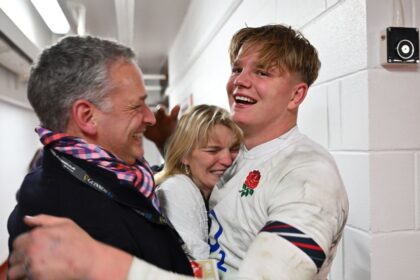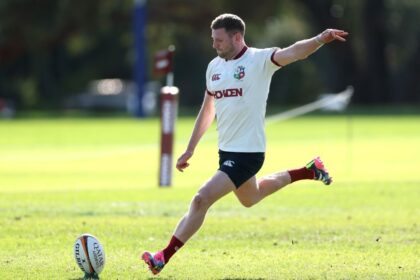The Harsh Return to Reality for Women’s Rugby Stars
After weeks of intense competition at the Women’s Rugby World Cup, Samoa captain Sui Pauaraisa faced the reality of everyday life. After training, captaining her team, and perfecting her game, Pauaraisa would video call her three children in New Zealand, making sure they were ready for school. The time Samoa spent in England was the longest she has been away from her family.The Samoan team returned home, each player taking separate paths and not knowing when they would meet again. Pauaraisa returned to Auckland before flying to her home in Christchurch, where she was awaited by the task of picking up her children from school and, the next day, returning to her job as a clinical administrator.“I can’t wait to see my children,” Pauaraisa said. “I just want to hug them, I want to kiss them.”
Sui Pauaraisa
Can Ilona Maher transform the Women’s Rugby World Cup?
This tournament has highlighted the existing disparity in the world of women’s rugby. Some players had to take unpaid leave, while others resorted to loans and crowdfunding to participate, leaving behind their loved ones with the aim of representing their country and inspiring future generations.
“That is the sacrifice I have made, I want to be someone they can admire,” Pauaraisa affirmed. “I want them to grow up and be strong women, I want to be a role model for them.”
Sui Pauaraisa

England and Samoa celebrate together after the Red Roses’ 92-3 victory.
The Women’s Rugby World Cup is an event that seeks to leave a legacy, but also highlights the existing inequalities in this sport. The hope is that this tournament will drive change and reduce the gap between teams. For the protagonists of this competition, the return to reality after three weeks of intense play means facing an uncertain future, without knowing when their next match will be or if they will be able to make a living from the sport they love. The differences are evident in all areas, from contracts to economic support. Teams like Samoa and Canada had to resort to crowdfunding to be able to participate in the World Cup.
For many players, the end of the group stage will be a shocking experience. Samoa coach Mataafa Ramsey Tomokino and captain Pauaraisa showed their emotion after the match against England, celebrating the three points they achieved. Mataafa Ramsey was moved when recalling the applause and welcome his team received when getting off the bus in Northampton.“Increasing the profile of women’s rugby around the world and working with them to raise the profile is the first step in being able to increase investment and commercial support, and unlock funding from governments, which is our focus in terms of financial sustainability over the next four years,” said Sally Horrox, World Rugby’s director of women’s rugby.
Sally Horrox
Red Roses star Abby Dow talks adversity, dad jokes and the world’s best attack
Amy Cokayne: The RAF officer and one-time Kiwi powering England’s scrum
Piper Duck’s exhausting injury journey to England
Pauaraisa, visibly moved, hugged her coach at the end of her passionate plea for greater support for Samoa.“I have seven siblings and I’m the oldest sister, so I have to take them to their sports and school activities, and I didn’t know if leaving would be manageable for my family. But as always, and as I anticipated, Mom said: ‘No way you’re not going. We’ll take care of everything here.’ She took that weight off my shoulders so I would have the courage to come without worries or stress. I am very grateful for my mother.”“I had doubts about whether I could get here financially, because I have a mortgage to pay… We are not contracted players and I didn’t know how it would work,” said Fa’asua Makisi, Samoa center.
Fa’asua Makisi

Back to Reality
After the excitement of playing in the World Cup, for many players the daily work will return. Sama Vergara, from Brazil, is a tattoo artist. Olivia DeMerchant, from Canada, is a firefighter. Manuqalo Komaitai works with the Irish Guard. Nomsai Mokwai, from South Africa, is an emergency room nurse. Drenna Falaniko, from Samoa, is a roofer. Then the question arises about the legacy, but also about this incredible gap in the players’ lives. The question for those returning home is: What’s next? For those with amateur backgrounds, this could be the highlight of their careers. Even for those who have played professionally, nothing has equaled this World Cup.And for those at the twilight of their careers, the focus is on post-rugby and legacy.“I don’t think I’ll ever have such a joyful experience through rugby again,” said Kanako Kobayashi, from Japan.
Kanako Kobayashi
Delgado previously spoke at the tournament about having to lie to her parents to pursue her dream in rugby. She obtained a scholarship as an honorary student at the University of Madrid for her master’s degree. But her true motivation, unknown to her parents, was to play for SANSE. She has been touched by the messages of support she has received from home, as they united behind the Lionesses. For Samoa, which has captivated many, they hope the new global calendar will give them room to grow. Mataafa Ramsey will take on a new role as High Performance General Manager at the Samoa Rugby Union.“The goal we set for ourselves is to leave a legacy by inspiring the youngest players and raising awareness of rugby in our country, where it is not very well known,” said Laura Delgado, from Spain.
Laura Delgado
“We have to do things in our region,” he said. “There are some funds coming from Pacific Coast Sport, for example, so we can create a Pacific competition. We need to reflect something like what the Six Nations have. So it’s us, Fiji, Samoa, Australia, New Zealand, who we have in our corner. We need to start doing that, and then maybe it will extend to an Asian country as well. I think if we can do that and get into professional spaces, then it will be much better”.
Mataafa Ramsey

But for those who stay, there is also uncertainty on the horizon. The fact of being in the qualifiers does not mean that some of the members of Scotland can escape the worry about what life will be like after the World Cup. They enter Sunday’s quarter-finals against England without being sure if they will have a contract after the tournament.“We want to be the first country to pave the way for women’s rugby in South America.
Now what we need are more matches, more tournaments, more support. We play two or three matches a year; I want to play nine, ten, twelve matches a year. I hope we are in the next Rugby World Cup”.
Emiliano Caffera
However, reaching the quarter-finals can, hopefully, mark a positive change at home.
Let’s take South Africa, whose incredible 29-24 victory over Italy secured them a place in the quarter-finals. This is a team that their own union prevented from competing in the 2017 World Cup due to poor results, while the men have won the 2019 and 2023 World Cups.
It’s almost a moment that’s like a beacon, if I may allude to that, where it shines a light so bright that it shines across the whole horizon. It’s a completely new path that has been created”.
Babalwa Latsha
And although the United States is out, Ilona Maher will stay to watch the rest of the competition. “I hope all the girls reach new heights,” said Maher. “I hope we’re in the quarter-finals, but we’ll see. I’ll watch all the matches and I’ll stay to watch them. It’s too good not to go to the World Cup knockout stage. It’s sold out at the Allianz [for the final] and I want to be a part of that”.
As the tournament progresses and we approach the final on September 27th, for the players of eight of the teams, the reality of daily life will return. “If you always have the dream of playing rugby, you first have to do the small things to get to the big ones,” said Kolora Lomani, from Fiji. We have been moved by mothers, office workers, teachers, tattoo artists, and firefighters in the last three weeks. But they are all World Cup players. “The competition and we have set new records,” said Latsha. “New paths have been established and also a validation of the dreams of many of us in our group, for some even a reactivation of dreams that may have been dormant.”






